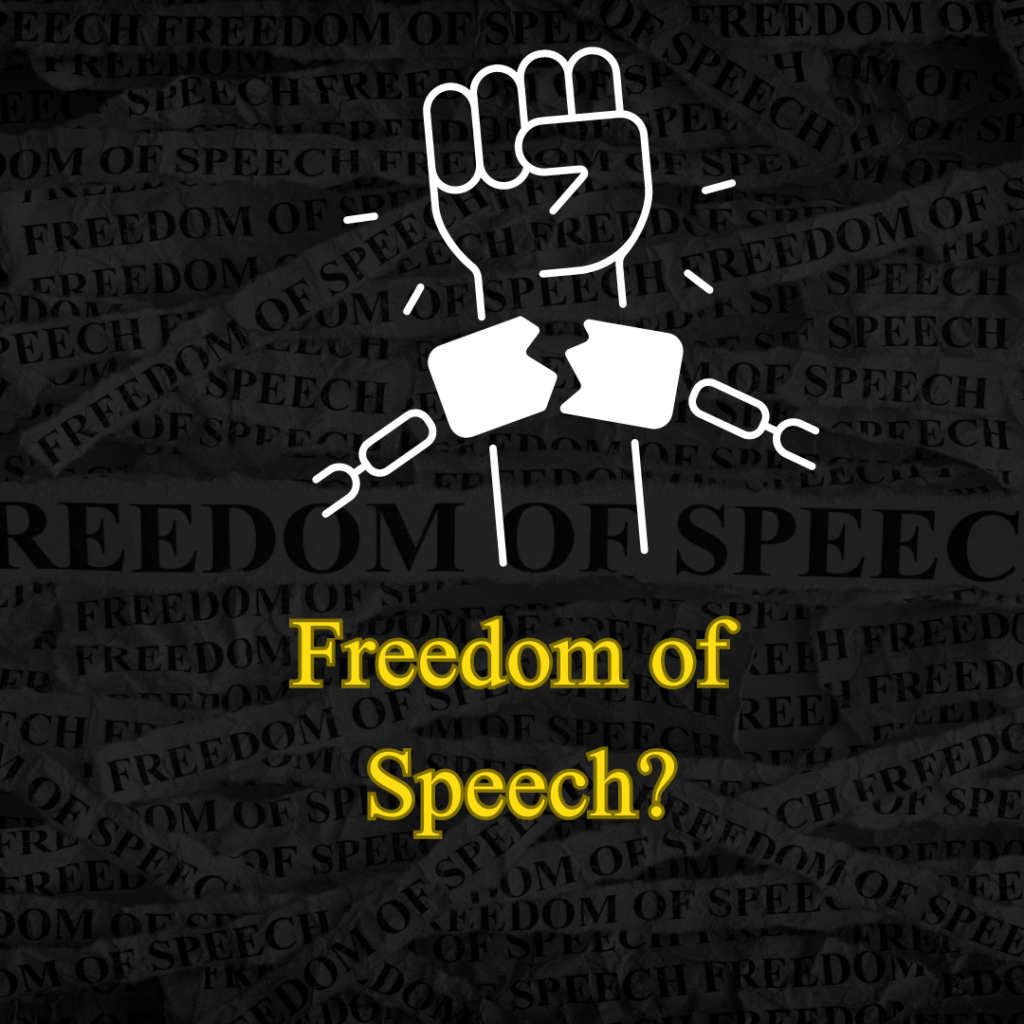Pakistani citizens are granted the right to freedom of expression under the 1973 Constitution. Article 19 states that every citizen has the right to freedom of speech, expression, and the press, subject to reasonable restrictions imposed by law. These restrictions may be in the interest of the glory of Islam, Pakistan’s integrity, security, or defense, friendly relations with foreign states, public order, decency, or morality, or in relation to contempt of court, commission of or incitement to an offense.

Freedom of speech and expression is protected under Pakistan’s Constitution and enjoys international protection through various statutes. The Universal Declaration of Human Rights (UDHR), in its Article 19, ensures the freedom of expression and opinion as a fundamental human right. This commitment to free speech is further reinforced by the International Covenant on Civil and Political Rights (ICCPR), which enshrines freedom of speech and expression under its Article 19.
In addition to these global frameworks, regional human rights instruments also safeguard these freedoms. For instance, Article 10 of the European Convention on Human Rights ensures the protection of freedom of expression across Europe, while the American Convention on Human Rights, through Article 13, upholds the right to freedom of expression and thought in the Americas. Similarly, the African Charter on Human and Peoples’ Rights guarantees the right to individual opinion within the bounds of law under Article 9.
These international and regional statutes underscore the global recognition of freedom of speech and expression as essential to the dignity and autonomy of individuals. They also provide a benchmark against which national laws, including those in Pakistan, can be evaluated. The international commitment to protecting these rights adds layer of accountability and reinforces the importance of upholding them in domestic legal systems.
Regulatory Laws:
PPC 124 A Section:
The following is what section 124-A of Pakistan Penal Code, 1860’s “Offences against the State” chapter VI says:
Anyone who brings or attempts to incite hatred or contempt towards the federal or provincial government established by law, or who does so through words, written or spoken, signs, visual representation, or any other means, faces a life sentence to which a fine may be added, or a sentence of imprisonment up to three years, with a fine may also be added, or punishment of fines.
The Pakistan Penal Code’s Section 124 A was passed in order to outlaw any sentiment that would incite people to rebel against the government in any number of ways. Unfair criticism of any government service is one approach that is feasible. Sedition is another possibility, which considers the level of dissatisfaction, hostility, or disdain that leads individuals to completely reject the administration. The following were the primary components of an offence under
Section 124-A:
a) The accused performed the in question acts, such as speaking, writing, making signs, or visually representing something;
b) As a result, the accused incited or sought to incite hatred or contempt, or aroused or attempted to incite disaffection; and
c) Such disaffection was directed toward the Federal or Provincial Government established by law.
Section 153A:
Section 153A of the Pakistan Penal Code criminalizes actions that promote enmity between different groups based on religion, race, language, or other characteristics. It specifically targets individuals who, through spoken or written words, signs, visible representations, or any other means, incite or attempt to incite disharmony, enmity, hatred, or ill-will between various religious, racial, linguistic, or regional communities. This provision also penalizes those who commit or incite others to commit acts prejudicial to maintaining harmony, particularly if such acts disturb or are likely to disturb public tranquility. Furthermore, it addresses the organization or participation in activities, such as drills or movements that involve or are intended to involve criminal force or violence against any identifiable group, with the knowledge that these actions could cause fear, alarm, or a sense of insecurity within the targeted group. Violations of Section 153A are punishable by imprisonment for up to five years, along with a fine.
Pakistan’s Constitution specifically guarantees the right to free speech. Additionally, the Constitution presents explicit prohibitions. Based on those limitations, the legislature has passed many legislation. Laws that limit the right to free speech include the Antiterrorism Act of 1997, the Security of Pakistan Act of 1952, the Contempt of Courts Ordinance of 2003, and the Pakistan Penal Code 1860.

In addition to this another Defamaton law in Pakistan is also in the legislation process which is known as The Punjab Defamtion Bill,2024 . To know more about this bill click here.
Recent Case laws:
Federation of Pakistan v. Samiullah (2020):
In brief: In this case, the Pakistan Telecommunication Authority (PTA) banned the video-sharing website TikTok. The ban was first imposed by the Peshawar High Court due of concerns about immoral content. Nevertheless, the prohibition was later overturned by the Sindh High Court, which declared that it violated the right to freedom of speech and expression. The court stressed how crucial it is to strike a balance between enforcing content regulations and defending fundamental rights.
Contempt of Court Case against Imran Khan (2022):
In brief: Imran Khan, the former prime minister, was charged with contempt of court for allegedly making threats against a female judge in a public speech. The case brought to light Pakistan’s conflict between the right to free expression and the power of the judiciary. Even though Imran Khan’s apology was eventually accepted by the court, the case highlighted the limitations of free speech, especially when it comes to criticism of the judiciary.

